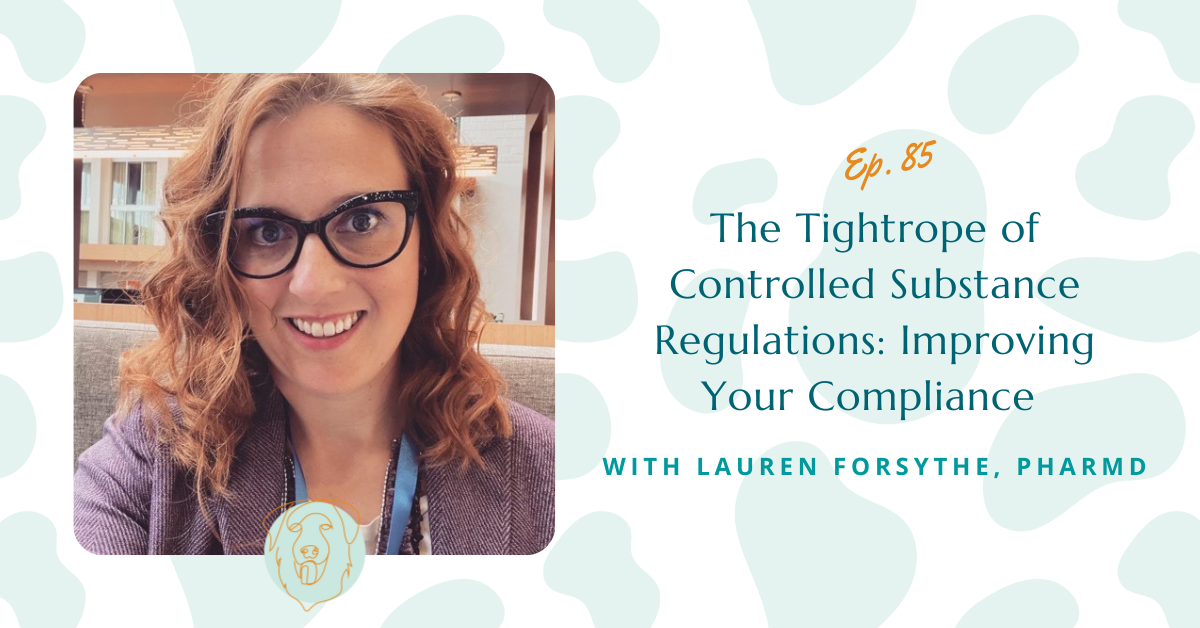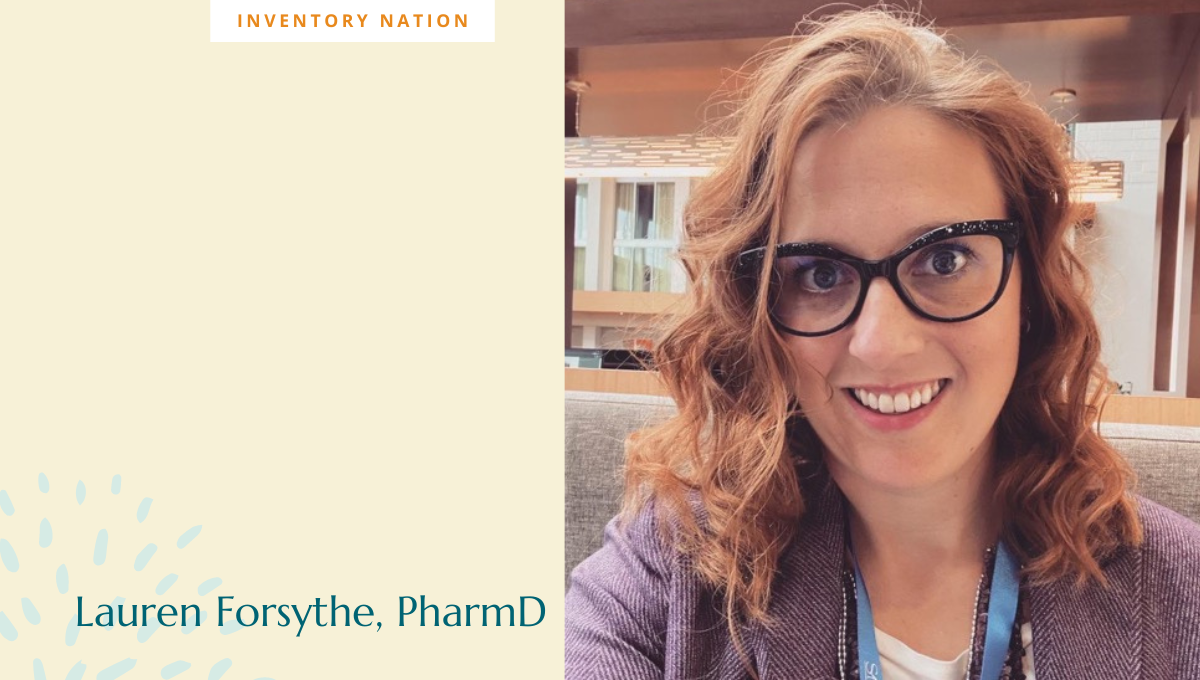TUNE IN: APPLE PODCASTS | SPOTIFY | GOOGLE PODCASTS | AMAZON MUSIC
An ounce of prevention is worth a pound of cure. Penny-wise and pound-foolish. Either of these adages apply perfectly to the topic at hand on this episode of Inventory Nation. Dr. Lauren Forsythe – a controlled substances expert and Pharmacy Service Head at the University of Illinois Veterinary Teaching Hospital – highlights for Host Nicole Clausen how risk mitigation can prevent costly regulatory compliance issues before they start. Their conversation focuses on why it’s important to establish dispensary protocols as well as concrete strategies to get the job done at your particular practice. You’ll learn about common mistakes and how to get around the reflexively fearful response many of us have when it comes to taking on the management of controlled substances.

EPISODE HIGHLIGHTS
- Landing in the Vet World: About Dr. Lauren Forsythe’s career path, which ironically did NOT start with her parents’ vet practice in Florida. She was initially headed towards human pharmacy when she found her calling “and hasn’t looked back since.â€
- Excelling at Controlled Substances: How Lauren developed her expertise through taking on her managerial role and responsibility as a pharmacist.
- What We Should Be Asking about Controlled Substances:
- Who is Responsible? Vets can delegate management, but the liability for ultimate outcomes rests with the practice’s license holder.
- Recommendations for Getting Controlled Substances Under Control:
- #1: Take a step back to understand the regulatory landscape.
- #2: Understand FDA expectations in terms of tracking each and every pill until it’s given, wasted or destroyed.
- #3: Identify gaps in your process in light of the end goal, which is to know how much and where any given substance is at any given time within your practice.
- #4: Create and oversee adoption of systems that track:
- How much of a drug is on hand.
- Where drugs are located.
- Who has (or potentially could have) access to controlled substances.
- What’s Practical and Appropriate:
- Safeguards that are essential in a large hospital setting are not necessarily needed in a small practice, which might require fewer security measures.
- Often Overlooked Areas:
- Regular inventory checks!
- Regulatory guidance may not be specific, but it’s important to stay on top of controlled substances.
- Consistent counting and tracking will avert overwhelming backlogs and catch-up – especially if a DEA officer come knocking!
- Lauren Recommends:
- Have a consistent monthly process in place to check your physical count compared to your log sheet and what you should have on hand.
- Engage the license-holder to keep them involved and everyone accountable.
- Have a comprehensive plan in place that includes the lens of a drug diverter:
- Where are the opportunities for theft?
- Where do your particular practice’s vulnerabilities lie?
- Are there backstops so no one person operates with too much autonomy?
- Hope for the best and plan for the worst! Trust but verify!
- How Lauren Tackled the University of Illinois’s Dispensary System:
- Updated processes that were obsolete.
- Did a gap analysis that revealed lots of problems.
- Put new policies in place for a range of eventualities.
- Continues learning on the job as new issues and needs emerge.
- Even When Your Day-to-Day Feels Overwhelming: Having SOPs and clearly stated policies in place can help steady your practice’s course.
- Minimum Annual Requirement: Your practice’s controlled substances procedures should undergo collective review (and updating where necessary) at least once a year!
- Inside a Vet Teaching Hospital’s Dispensary Practices:
- Robust education, checks and balances.
- Multiple automated dispensing cabinets across the departments.
- Logging procedures at every juncture of access.
- In-person orientation to ensures everyone understands policies and processes.
- Checking drugs five days a week, including counting every pill that has been accessed and matching against anticipated quantities.
- Security camera footage available if further investigation is required.
- Audit records from every hospital service using controlled substances to ensure documentation meets standards and requirements.
- Logs established specifically for ambulatory situations.
- Consulting with veterinarians and health officers to provide licensing and other regulatory support.
- Lauren points out that her dispensary systems are a mix of high-tech and old-fashioned paper logging and tracking.
- Most Common Problems:
- Maintaining records thorough enough and properly filed.
- Understanding DEA expectations for procedures and immediate access to required records.
- Failing to file C-2 records (invoices and log sheets) separately.
- You Won’t Regret Controlling Controlled Substances: While there may be costs associated with putting staff, training and technological resources in place, the price of DEA violations is far higher!
- Word to the Wise: Don’t fall prey to fear or denial! There are resources out there to help you come up with a solid framework for managing controlled substances.
- Lauren’s Recommendations:
- Consider seeking advice from DEA agents, whom she has found very helpful.
- Utilize your state vet med association – which can either provide answers or contact the DEA with questions on your behalf.
- Look critically at the gaps in your systems – whether by hiring a consultant or asking a friend who works in a vet hospital. A second set of eyes helps!
- Pursue continuing education from a variety of sources.
- Consider human substance control CE. It may not count towards your vet certification but provides interesting insights into diversion programs out there.
- Parting Thought: Don’t keep putting it off. Controlled substance management is hard to start but, if you chip away at it, you will get there – and feel enormous relief!
KEY QUOTES
“I never found an area of human pharmacy that I really loved. Then halfway through my schooling my compounding professor said, ‘Hey, have you thought about vet pharmacy?’ I didn’t know that was a thing, but it sounded perfect!†(Lauren)
“It doesn’t matter who delegated the responsibility (for controlled substances), the responsibility still lies with them and a lot of (license-holders) fail to ask what’s going on.†(Lauren)
“While it’s frustrating that (FDA) regulations are so grey and leave so much open for interpretation, it is also on the flip side a blessing because it gives us the flexibility to determine what is practical and appropriate in a setting.†(Lauren)
“As veterinary professionals we want to trust our staff and I think that’s super-important, but it’s also important to have systems and processes in place so if something happens we know about it.†(Nicole)
“I felt like I was looking into Pandora’s Box (of compliance issues) and never seemed to reach the bottom … I did eventually get to the bottom and start to build back up. But it’s been a process.†(Lauren)
“Controlled substances especially, and inventory, are not really things you can kind of set and forget. You have to continually re-evaluate to see if it’s working. Are there gaps? Are we missing things? Are we being compliant?†(Nicole)
“Sometimes when you’re focusing day-to-day on patient care it can feel like you’re just trying to make it through the day – let alone keep these processes revamped.†(Nicole)
“I say if it’s important enough to document and has to do with controlled substances, it’s important enough to keep.†(Lauren)
“I think of controlled substance logging as like a diary. From the second it arrives in your practice to the second it leaves … your record-keeping is that diary from start to finish.†(Nicole)
“(DEA compliance) is a lot and might require investment in technology or extra staff to manage it, but … it’s worth the cost because criminal issues and fines are so expensive. It’s way less expensive to prevent them in the first place.†(Lauren)
“I learned a lot from human health care and supply chain management and it gave me a lot of inspiration for the systems I’ve created in vet med.†(Nicole)
“As you get more (controlled substances systems) in place, it becomes less intimidating. And then you can fine tune. The blank page is the worst part, so start defining that!†(Lauren)
MEET LAUREN FORSYTHE, PharmD
Dr. Forsythe is a Clinical Assistant Professor of Pharmacy and the Pharmacy Service Head at the University of Illinois Veterinary Teaching Hospital. She is also a diplomat of the International College of Veterinary Pharmacists. Dr. Forsythe graduated from the University of Findlay, College of Pharmacy in 2015 and completed her veterinary pharmacy residency at Purdue’s Veterinary Teaching Hospital. Following completion of her residency, Dr. Forsythe spent three years at the UC Davis Veterinary Medical Teaching Hospital as a Clinical Pharmacist before coming to UIUC in 2019.
LINKS + RESOURCES MENTIONED IN THE EPISODE
- VISN: https://www.veterinaryisn.com/
- Inventory Ally – Inventory Management Software: https://inventoryally.com/
- Free Resources: www.vetlogic.co/education
